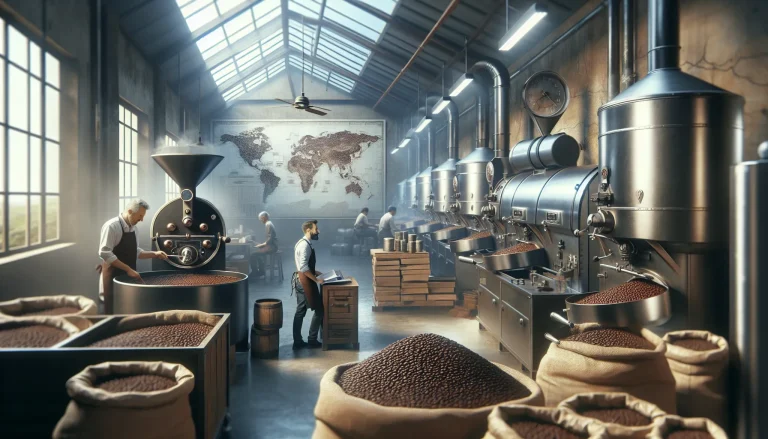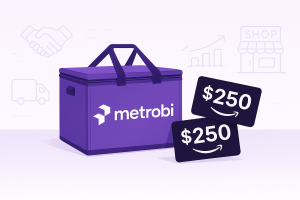Join the coffee revolution. This ultimate guide explores how to start a coffee roaster business in 2024, flooding you with a unique blend of business insights and brewing wisdom.
The face of the specialty coffee industry is undergoing a seismic shift, and it’s the entrepreneurs brewing their own storms who prosper. Roasting businesses are no longer a luxury; they’re a necessity to stand out in an ocean of Java giants. Discover invaluable insights and advice on launching your own coffee shop, including developing a comprehensive business strategy, selecting an ideal venue, and assembling the right team.
Sparking a coffee roaster business isn’t just about the crackle of beans; it involves understanding nuances of supply chains, perfecting a roasting craft, and unlocking enormous entrepreneurial satisfaction.
But how do you crash into this rapidly caffeinating sector?
In the time it takes to sip your morning coffee, you will go from a coffee enthusiast to a fully equipped roaster entrepreneur. We’ve got the beans. Do you have the grit?
👀 Social Buzz: Coffee Advertising's Wide Reach
48% of coffee drinkers remember seeing advertising on social media.
Save 80% of delivery management time
We handle everything:
- Dedicated operations manager
- Real-time tracking dashboard
- Automated customer notifications
- Urgent issue resolution
Step-by-Step Guide to Start a Coffee Roaster
Beginning a coffee roasting business is an intricate task that requires a crucial understanding, essential equipment, and a unique business strategy.
Step 1: Understanding the Coffee Roasting Process
The core of any coffee roasting business lies in understanding the science of transforming raw beans into flavorful brews. This process, essentially, involves heating green coffee beans at specific temperatures for fixed durations.
1 in every 3 entrepreneurs beginning a coffee roasting business fails due to a lack of knowledge at this step. From knowing the types of beans to understanding the different roast levels, the learning curve can be high. It would be beneficial to learn about the temperatures at which beans crack, different aroma profiles, and how the flavor changes with roasting duration.
Step 2: Coffee Roasting Equipment Essentials
Once your knowledge base is solid, the next step is securing the right equipment. Essential coffee roasting machinery involves the roaster itself, bean loader, de-stoner, and packaging equipment.
The type of roasting equipment you choose significantly impacts the quality of your coffee beans. Whether you opt for a fluid bed roaster or a drum roaster, each has its pros and cons.
🔄 High Turnover in Coffee Roasting Careers
Coffee roasting emerges as a field with high turnover, indicating it's often a short-term career choice for many.
Types of Coffee Roasters Available in the Market and Their Features
Coffee roasters come in various types, each with unique features that impact the roasting process and the quality of the final product. Here are the main types of coffee roasters available in the market along with their distinctive characteristics:
- Drum Coffee Roasters:
Heating Method: Utilizes both conduction and convection heating to roast beans.
Operation: Features a solid drum that rotates over a gas flame to heat the coffee beans.
Roasting Process: Conductive heat transfer occurs through direct contact with the drum surface, while convection heat is applied through hot air circulation.
Control: Generally easy to control and manipulate, but requires attention to prevent scorching or flavor distortion.
Types: Available as single-wall drums or double-wall drums, with double-wall drums providing more stable roasting due to air heating the inner wall. - Fluid Bed Coffee Roasters:
Heating Method: Relies solely on convection heating for roasting coffee beans.
Operation: Hot air rises through a chamber into the roaster, causing coffee beans to float in the hot air stream.
Advantages: Known for roasting beans evenly and quickly, eliminating the risk of scorching associated with conductive heat.
Environmentally Friendly: Typically electric-powered, making them eco-friendly options for reducing carbon footprint.
It’s critical to not skimp on equipment quality, as 1 in 2 roasting businesses that don’t invest in good machinery fail within the first two years.
Step 3: Crafting Your Unique Coffee Roasting Business Plan
After establishing this foundation, you need a distinctive business plan that distinguishes your coffee roasting business. Predominantly, it should touch upon target market analysis, marketing strategies, operations plans, and financial projections.
Target Market Analysis
Your business strategy should cater to the needs of your desired customer base. Notably, millennials represent 44% of coffee consumers and display a trend toward specialty coffees.
☕️ Wealthy Brews: The Affluent Coffee Drinkers of America
37% of coffee drinkers have a high annual household income.🌟 Pioneers in the Morning: Coffee's Innovative Consumers
15% of coffee drinkers are innovators or early adopters of new products.💡 Enlightened Sips: Coffee Drinkers & Economic Concerns
A relatively high share of coffee drinkers think that rising prices, inflation & cost of living are issues that need to be addressed.
Marketing Strategy
A well-thought-out marketing strategy forms the backbone of your business plan. The current trend suggests that a strong online presence coupled with ties to local businesses can be highly beneficial.
Operations Plan
The operations plan should entail everything from the roasting process, effective sourcing of green beans, storage, packaging, and distribution. Not having an effective operations plan can lead to wastage, with some businesses reporting a loss of nearly 20 lbs of beans per week.
Financial Projections
Finally, your business plan needs sound financial projections. A comprehensive understanding of total costs – including equipment, beans, payroll, and overhead – is a must. On the flip side, careful forecasting of potential profits considering market trends, growth rates, and volume can guide your venture towards success.
With these steps polished and in motion, your coffee roasting business is well on its way.
Metrobi is transforming coffee deliveries
Specialized solutions for coffee businesses:
- Coffee-trained drivers
- Proper handling equipment
- Peak day delivery support
- 23% average cost reduction
Navigating the Coffee Roasting Industry
After delving into the step-by-step guide to starting your coffee roasting business, it’s prime time for you to journey through the maze of the coffee roasting industry. This section will act as your compass, guiding you to better navigate the industry terrain.
Understanding Coffee Roasting Regulations
“This is not for the faint-hearted.” While this phrase might sound overused, it rings true in the coffee roasting industry. Navigating through the web of industry regulations might seem like a daunting task, but with the right understanding, it becomes a navigable terrain.
Coffee roasting regulations are complex and vary greatly depending on your region. These regulations, such as the ones concerning air emissions and waste management, should be at the forefront of your contemplation.
Compliance with Regulations
Compliance with these regulations is crucial if you want to avoid hefty fines and potential license revocations. It’s not an exaggeration to say that the lifeblood of your coffee roasting business rests upon understanding and complying with these regulations.
Marketing Strategies for Coffee Roasting Business
A top-notch product won’t sell itself. You need to match the excellence of your product with effective marketing endeavors. It all begins with creating a marketing strategy and ends with out-of-the-box tactics to see it through.
🔥 Starting Small: The Ideal Coffee Roasting Equipment
A 5 kg capacity classic drum roaster is suitable for small roasting businesses.
📦 Bean to Bag: Essential Coffee Roasting Supplies
You will need green beans, packaging, and shipping supplies to start your business.
💸 Brew Your Dream: Coffee Roasting Startup Costs
The average startup cost for a coffee roasting business is $120,000.
📃 Legal Brews: Necessary Coffee Roasting Business Licenses
Coffee roasting businesses require several permits and licenses, including EPA requirements and permits for volatile organic compounds and harmful particulate matter.
Real-Life Case Studies of Successful Coffee Roasting Businesses
1. Pilot Coffee Roasters:
– Overview: Pilot Coffee Roasters, founded in Toronto by Andy and Jessie Wilkin, is a wholesale and retail coffee roasting business known for its specialty coffee offerings and emphasis on education.
– Operations: They source beans from the origin, roast in-house, manage 3 retail spaces, and offer coffee and tea brewing accessories.
– Innovation: Pilot Coffee Roasters focuses on quality, education, and innovation, offering training programs for baristas, Espresso Labs for customers, and a monthly blog showcasing new products and experiments.
2. Markoff Coffee Roastery Co., Ltd.:
– Overview: This Thai-based company focuses on specialty coffee roasting and has developed a unique business model.
– Approach: The company’s business model emphasizes the value stream from coffee beans to brewing, highlighting the critical role of the roasting process in enhancing coffee quality.
– Innovation: Markoff Coffee Roastery Co., Ltd. has implemented an Appreciative Inquiry-based method to generate a successful business model for specialty coffee roasting.
3. Mike Shea’s Coffee Roasting Company:
– Overview: Mike Shea’s Coffee Roasting Company is a testament to starting a successful coffee roasting business even in a mature industry.
– Journey: Mike transitioned from working in a coffee shop with his father to establishing his own roasting company focused on quality and consistency.
– Success Factors: Emphasizing consistent quality, ongoing improvement, customer feedback, and staying close to customers have been key factors contributing to the success of Mike Shea’s Coffee Roasting Company.
These case studies showcase different approaches to success in the coffee roasting industry, emphasizing factors like quality, innovation, customer feedback, and continuous improvement as crucial elements for building thriving coffee roasting businesses.
Crafting a Marketing Strategy
At the heart of successful marketing lies a powerful strategy. This includes defining your unique selling proposition (USP), identifying your target market, and setting achievable yet stretching marketing goals.
Innovative Marketing Tactics
Once your strategy is in place, innovative marketing tactics will solidify your spot in the industry. Think content marketing, partnerships, interactive events, and cutting-edge social media campaigns.
Your mastery of coffee roasting regulations, combined with a laser-focused marketing strategy, lays the framework for achieving success in the coffee roasting industry. Each plays a crucial part in your overall navigation within the industry. Now that you’re equipped with this knowledge, you’re one step closer to brewing excellence in your coffee roasting business.
Growing Your Coffee Roasting Business
Scaling Your Coffee Roasting Business
The coffee world is perpetually thriving, with an insatiable demand for flavorful coffee beans. A coffee roasting business can be a profitable venture, especially considering the universal love for fresh-roasted coffee. Scaling up your coffee roasting operations is the logical next step after your initial launch – it’s a delicate process that necessitates precision, financial investment, and changes in both your roasting and distribution practices. Discover essential strategies and insights on initiating a coffee roasting business, including developing an effective business strategy, choosing a strategic location, and assembling the right team.
Investing in larger roasters, building partnerships, and tapping into new markets should be your primary focus points. A larger coffee roaster machine will let you roast larger quantities, streamlining your operation. Partnerships with cafes and retail outlets can establish steady distribution lines, securing consistent sales. Moreover, exploring new market niches can open up lucrative opportunities.
What is a Coffee Roasting Business?
A coffee roasting business is a specialized venture that roasts green coffee beans to a variety of roast profiles. The business harnesses the transformation of the physical and chemical properties of green coffee beans into roasted coffee products. The company then packages and sells these to coffee shops, grocery stores, online customers, or directly to consumers in their own retail space. Discover the secrets to crafting a compelling website for your coffee roasting business, highlighting its unique offerings and attracting more visitors with strategic design and content.
In essence, it’s a business that delivers an end product – roasted coffee – from a raw material – the coffee bean. Your unique selling point lies in your desired roast profile, which can make a difference in enticing a discerning coffee clientele. Discovering the perfect location for your coffee shop can significantly enhance your ability to attract the sophisticated coffee lovers you aim to serve.
Market Trends in Coffee Roasting
- Increased Consumption of Fresh Coffee: Demand for fresh coffee drives the market, highlighting its health benefits.
- Value-Added Coffee Products: Innovations like RTD and flavored coffee are attracting consumers and driving growth.
- Growing Demand in Hospitality and Offices: Increased coffee consumption in these sectors boosts the whole-bean segment.
- Health Consciousness: Preference for green ground coffee due to its health benefits.
- Coffee Equipment Technology Advancements: New technologies like the Series 2 Bellwether Automated Roasting System are revolutionizing the industry.
- Growing Number of Coffee Outlets: Increasing outlets and new flavor blends by global brands fuel growth.
- Market Segmentation: Segmentation by roaster type and application, including Factory, Coffee Shop, Household, and Others.
- Geographical Segmentation: Europe leads the market, with Asia Pacific as the fastest-growing region.
Why Start a Coffee Roasting Business?
Enter the coffee roasting business because it’s a booming industry with an invigorating product that has a global market. The increasing societal interest in higher-quality coffee offers numerous opportunities to experts willing to venture into the roasting territory. Your passion for coffee, combined with the right skill set, can lead to a profitable business venture. Discover how to secure your initial coffee roasting clients by harnessing these professional strategies tailored for the bustling coffee market.
Additionally, starting a coffee roasting business gives you the control to fine-tune your own coffee’s flavor profile, offering customers something unique and exciting. Stepping into the roasting business offers you the chance to be a critical part of the thriving specialty coffee community.
Roasted Coffee Business Statistics You Need to Know
- Coffee Roaster Tenure: The average coffee roaster stays at their job for 1-2 years.
- Coffee Roaster Unemployment Rate: The unemployment rate for coffee roasters has varied between 2.2% and 13.11% between 2008 and 2021.
Profit Margins for Coffee Roasting Business
The profit margins for coffee roasting businesses typically range between 10% and 25%, with variations depending on factors such as pricing strategy, operating costs, and overall market demand. The profitability of a coffee roasting business depends on how effectively it leverages its size to capitalize on market demands, meet customer needs, and manage operational costs. Each size category presents unique opportunities, and the key to success lies in adapting strategies tailored to the specific challenges and advantages of the business’s size.
Pouring the Final Cup: Your Coffee Roasting Business Journey Begins Now
Venturing into the world of coffee roasting requires strategic planning and meticulous execution. Clearly, it matters how you source your beans, understand roasting profiles, and nail marketing strategies.
This journey is undoubtedly challenging but offers rewarding experiences and cup-filling returns. It brings not just entrepreneurial success but also the pleasure of serving high-quality, freshly roasted coffee.
Now, it’s your time to step up and make a mark in the coffee industry. Plan your budget, find the perfect beans, master the art of roasting, and get your marketing game on point. Every step carries weight, and every decision brings you closer to your dream coffee roasting business.
Are you ready to sip the success your carefully crafted coffee roasting business can bring? What are some roasting techniques you are excited to implement?
Remember, the taste of success is always better when it’s brewed to perfection. Go, create your signature blend, let the world taste your passion, and remember, caffeinated dreams do come true.














